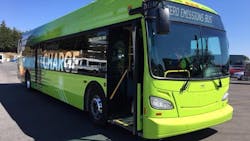BC Transit upgrading two facilities to better support operations, zero-emissions transition
BC Transit is upgrading two facilities to help operations and increase electric bus infrastructure as more zero-emission buses are expected to join fleets next year.
Hardy Street Facility
The agency notes improvements to increase operational capacity at its Hardy Street Facility are progressing to the next stage, with work to advance electric bus infrastructure, expand bus parking and improve maintenance capacity underway. The facility is where BC Transit buses are stored, maintained, fueled, cleaned and prepared to deliver daily service in the Kelowna Regional Transit System. The overall upgrade project enhances functional areas of the facility and replaces aging components to extend the operational life of the building.
BC Transit notes 22 electric buses are expected to join the Kelowna Regional Transit System in 2026. Preparations to support electric buses are underway and include:
- 32 electric charging stations and new electrical service.
- Expanded building space for storing electric buses and charger parts.
- Additional maintenance space, including a parts mezzanine.
- Installation of a gantry crane and roof access platform to help maintain battery-electric buses.
According to BC Transit, the series of facility upgrades also supports the continued demand for transit in the region. The overall project enhances functional areas of the facility and replaces aging components to extend the operational life of the building. Work includes:
- Expanded bus parking to hold up to 130 buses.
- Larger parts and storage area.
- Updated lighting, doors, ventilation, safety and security systems.
- New changing rooms and lunchroom for maintenance staff.
- A new bus wash system (completed earlier this year).
The project is expected to complete by summer 2026 and is being cost shared by the government of Canada, the province of British Columbia and local government partners.
Whistler Transit Center
Construction on electric bus infrastructure will begin later this month at the agency’s Whistler Transit Center. BC Transit notes the city of Whistler, B.C., is currently scheduled to receive 15 heavy-duty electric buses after construction is complete in fall 2026. Work to prepare the site to receive new electric buses includes:
- Infrastructure for 16 charging stations.
- Power distribution equipment.
- Upgrades to the bus maintenance facility.
- Site works to support equipment installations.
BC Transit notes the public will not be impacted by construction, and no traffic disruptions are expected. Customers can expect bus service to continue as scheduled.
According to the agency, eight of its systems are lined up for electrification projects, including Kamloops, Kelowna, Nanaimo, Nelson, Powell River, Sunshine Coast, Victoria and Whistler. BC Transit has 125 heavy-duty electric buses on order and in production with Nova Bus and New Flyer and 10 electric buses are currently in service in Victoria.
BC Transit notes electric bus infrastructure in Whistler is part of its Battery Electric Bus Facility Upgrades. The bundle of projects includes electrification infrastructure construction projects in Whistler, Victoria and Nelson. The government of Canada and the province of British Columbia have made a joint investment of C$50.2 million (US$35.8 million) for the projects through the Investing in Canada Infrastructure Program.
Funding of C$395.5 million (US$281.8 million) for BC Transit electric buses and infrastructure was announced in July 2023 and is supported in part by the Zero Emission Transit Fund and the Investing in Canada Infrastructure Program.
About the Author
Brandon Lewis
Associate Editor
Brandon Lewis is a recent graduate of Kent State University with a bachelor’s degree in journalism. Lewis is a former freelance editorial assistant at Vehicle Service Pros in Endeavor Business Media’s Vehicle Repair Group. Lewis brings his knowledge of web managing, copyediting and SEO practices to Mass Transit magazine as an associate editor. He is also a co-host of the Infrastructure Technology Podcast.

